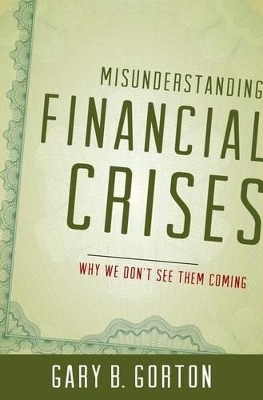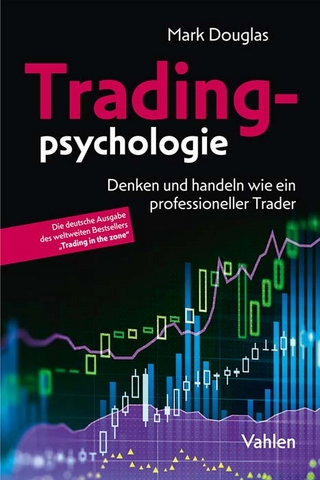
Misunderstanding Financial Crises
Why We Don't See Them Coming
Seiten
2012
Oxford University Press Inc (Verlag)
978-0-19-992290-1 (ISBN)
Oxford University Press Inc (Verlag)
978-0-19-992290-1 (ISBN)
An explanation and history of financial crises.
Prior to the financial crisis of 2007-2008, economists thought that no such crisis could or would ever happen again in the United States, that financial events of such magnitude were a thing of the distant past. In fact, observers of that distant past--the period from the half century prior to the Civil War up to the passage of deposit insurance during the Great Depression, which was marked by repeated financial crises--note that while legislation immediately after crises reacted to their effects, economists and policymakers continually failed to grasp the true lessons to be learned.
Gary Gorton, considered by many to be the authority on the financial crisis of our time, holds that economists fundamentally misunderstand financial crises--what they are, why they occur, and why there were none in the U.S. between 1934 and 2007. In Misunderstanding Financial Crises, he illustrates that financial crises are inherent to the production of bank debt, which is used to conduct transactions, and that unless the government designs intelligent regulation, crises will continue. Economists, he writes, looked from a certain point of view and missed everything that was important: the evolution of capital markets and the banking system, the existence of new financial instruments, and the size of certain money markets like the sale and repurchase market. Delving into how such a massive intellectual failure could have happened, Gorton offers a back-to-basics elucidation of financial crises, and shows how they are not rare, idiosyncratic, unfortunate events caused by a coincidence of unconnected factors. By looking back to the "Quiet Period " from 1934 to 2007 when there were no systemic crises, and to the "Panic of 2007-2008, " he brings together such issues as bank debt and liquidity, credit booms and manias, and moral hazard and too-big-too-fail, to illustrate the costs of bank failure and the true causes of financial crises. He argues that the successful regulation that prevented crises did not adequately keep pace with innovation in the financial sector, due in large part to economists' misunderstandings. He then looks forward to offer both a better way for economists to conceive of markets, as well as a description of the regulation necessary to address the historical threat of financial crises.
Prior to the financial crisis of 2007-2008, economists thought that no such crisis could or would ever happen again in the United States, that financial events of such magnitude were a thing of the distant past. In fact, observers of that distant past--the period from the half century prior to the Civil War up to the passage of deposit insurance during the Great Depression, which was marked by repeated financial crises--note that while legislation immediately after crises reacted to their effects, economists and policymakers continually failed to grasp the true lessons to be learned.
Gary Gorton, considered by many to be the authority on the financial crisis of our time, holds that economists fundamentally misunderstand financial crises--what they are, why they occur, and why there were none in the U.S. between 1934 and 2007. In Misunderstanding Financial Crises, he illustrates that financial crises are inherent to the production of bank debt, which is used to conduct transactions, and that unless the government designs intelligent regulation, crises will continue. Economists, he writes, looked from a certain point of view and missed everything that was important: the evolution of capital markets and the banking system, the existence of new financial instruments, and the size of certain money markets like the sale and repurchase market. Delving into how such a massive intellectual failure could have happened, Gorton offers a back-to-basics elucidation of financial crises, and shows how they are not rare, idiosyncratic, unfortunate events caused by a coincidence of unconnected factors. By looking back to the "Quiet Period " from 1934 to 2007 when there were no systemic crises, and to the "Panic of 2007-2008, " he brings together such issues as bank debt and liquidity, credit booms and manias, and moral hazard and too-big-too-fail, to illustrate the costs of bank failure and the true causes of financial crises. He argues that the successful regulation that prevented crises did not adequately keep pace with innovation in the financial sector, due in large part to economists' misunderstandings. He then looks forward to offer both a better way for economists to conceive of markets, as well as a description of the regulation necessary to address the historical threat of financial crises.
The Frederick Frank Class of 1954 Professor of Finance at the Yale School of Management
Preface ; I. Introduction ; II. Creating the Quiet Period ; III. Financial Crises ; IV. Liquidity and Secrets ; V. Credit Booms and Manias ; VI. The Timing of Crises ; VII. Economic Theory without History ; VIII. Debt During Crises ; IX. The Quiet Period and Its End ; X. Moral Hazard and Too-Big-To-Fail ; XI. Bank Capital ; XII. Fat Cats, Crisis Costs, and the Paradox of Financial Crises ; XIII. The Panic of 2007-2008 ; XIV. The Theory and Practice of Seeing ; Bibliographic Notes ; Notes ; References ; Index
| Erscheint lt. Verlag | 27.12.2012 |
|---|---|
| Verlagsort | New York |
| Sprache | englisch |
| Maße | 157 x 236 mm |
| Gewicht | 567 g |
| Themenwelt | Wirtschaft ► Betriebswirtschaft / Management ► Finanzierung |
| Betriebswirtschaft / Management ► Spezielle Betriebswirtschaftslehre ► Bankbetriebslehre | |
| Wirtschaft ► Volkswirtschaftslehre ► Finanzwissenschaft | |
| ISBN-10 | 0-19-992290-X / 019992290X |
| ISBN-13 | 978-0-19-992290-1 / 9780199922901 |
| Zustand | Neuware |
| Haben Sie eine Frage zum Produkt? |
Mehr entdecken
aus dem Bereich
aus dem Bereich
warum unser Geld stirbt und wie Sie davon profitieren
Buch | Hardcover (2024)
FinanzBuch (Verlag)
30,00 €
denken und handeln wie ein professioneller Trader
Buch | Softcover (2023)
Vahlen, Franz (Verlag)
36,90 €


